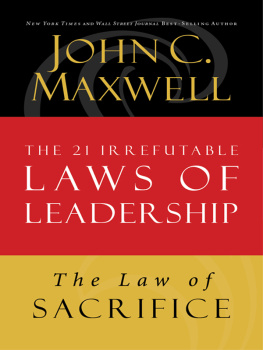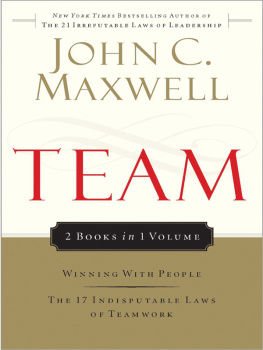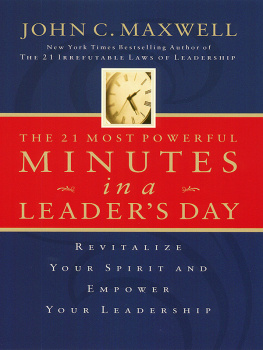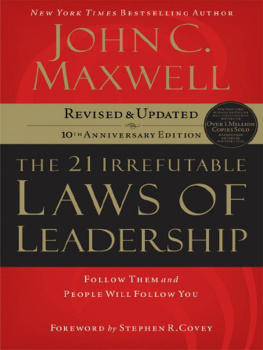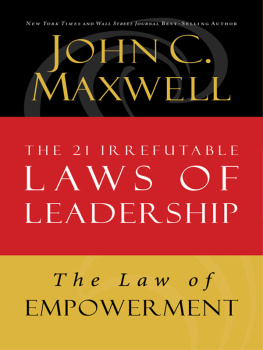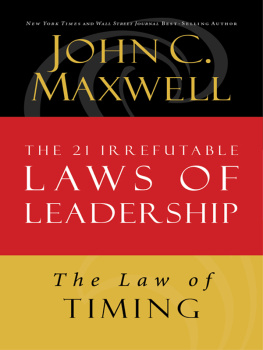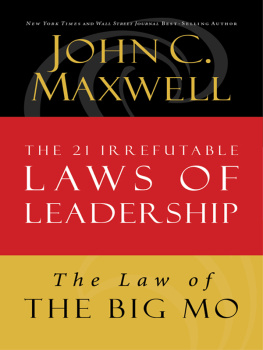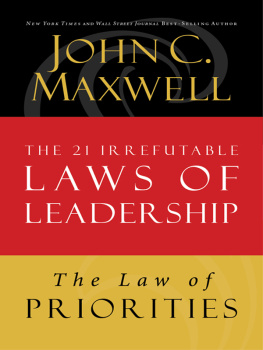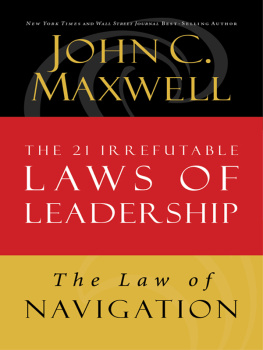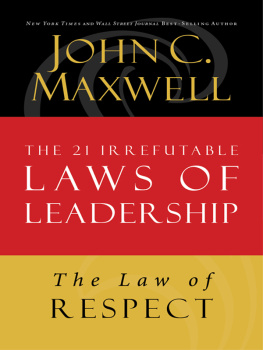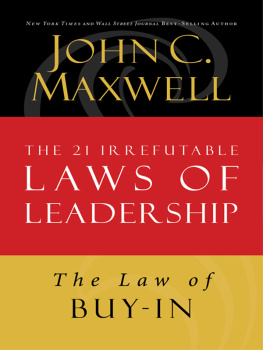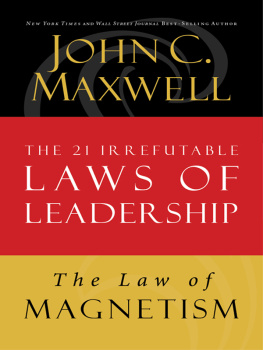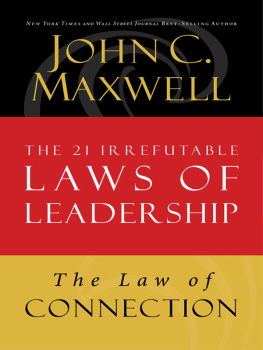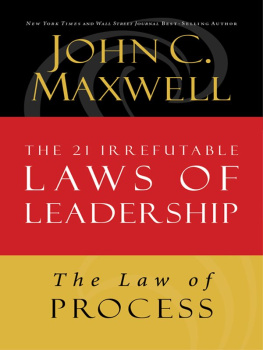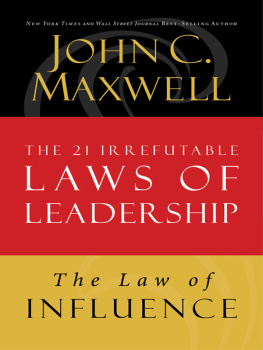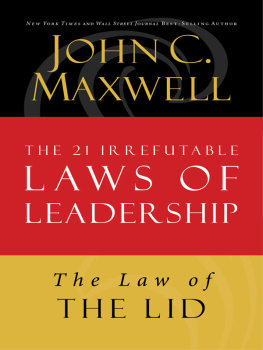
1998 and 2007 by John C. Maxwell
This ebook is derived from The 21 Irrefutable Laws of Leadership, by John Maxwell, 1998 and 2007 by Maxwell Motivation, Inc., a Georgia corporation.
All rights reserved. No portion of this book may be reproduced, stored in a retrieval system, or transmitted in any form or by any meanselectronic, mechanical, photocopy, recording, scanning, or otherexcept for brief quotations in critical reviews or articles, without the prior written permission of the publisher.
Published in Nashville, Tennessee, by Thomas Nelson. Thomas Nelson is a trademark of Thomas Nelson, Inc.
Thomas Nelson, Inc. titles may be purchased in bulk for educational, business, fund-raising, or sales promotional use. For information, please e-mail SpecialMarkets@ThomasNelson.com.
Published in association with Yates & Yates, LLP, Attorneys and Counselors, Orange, California.
Scripture quotations noted CEV are from THE CONTEMPORARY ENGLISH VERSION.
1991 by the American Bible Society. Used by permission.
Scripture quotations noted The Message are from The Message: The New Testament in Contemporary English. 1993 by Eugene H. Peterson.
ISBN 978-0-7852-7431-5 (HC)
ISBN 978-1-4185-3831-6 (ebook)
ISBN 978-1-4002-7577-9 (ebook of Chapter 18)

This book is dedicated to Charlie Wetzel, my writing partner since 1994. Together weve written more than forty books, and Ive enjoyed our collaboration on every one. As I have labored to add value to others by identifying and teaching leadership principles, Charlie, you have added value to me and my efforts. Your insights and skills as a wordsmith have been enjoyed by millions of readers. As a result, you have made a greater impact on more people than has anyone else in my inner circle. For that I thank you.
CONTENTS


Thank you to the thousands of leaders around the world who learned and sometimes challenged the laws of leadership, thus sharpening my thinking.
Thank you to the team at Thomas Nelson who gave me the chance to revise and improve this book, and especially to Tami Heim for her strategic leadership and to Victor Oliver who was instrumental in the development of the original concept.
Thank you to Linda Eggers, my executive assistant, and her assistant, Sue Caldwell, for their incredible service and willingness to go the extra mile every day.
Thank you to Charlie Wetzel, my writer, and Stephanie, his wife, with-out whose work this book would not have been possible.

A Leader Must Give Up to Go Up
Why does an individual step forward to lead other people? For every person the answer is different. A few do it to survive. Some do it to make money. Many desire to build a business or organization. Others do it because they want to change the world. That was the reason for Martin Luther King Jr.
SEEDS OF GREATNESS
Kings leadership ability began to emerge when he was in college. He had always been a good student. In high school, he skipped ninth grade. And when he took a college entrance exam as a junior, his scores were high enough that he decided to skip his senior year and enroll in Morehouse College in Atlanta. At age eighteen he received his ministerial license. At nineteen he was ordained and received his bachelors degree in sociology.
King continued his education at Crozer Seminary in Pennsylvania. While he was there, two significant things happened. He heard a message about the life and teachings of Mahatma Gandhi, which forever marked him and put in motion his serious study of the Indian leader. He also emerged as a leader among his peers and was elected president of the senior class. From there, he studied for his PhD at Boston University. It was also during this time that he married Coretta Scott.
SEEDS OF SACRIFICE
King accepted his first pastorate in Montgomery, Alabama, at the Dexter Avenue Baptist Church in 1954 and settled into family life when his first child was born the next year in November. But that peace didnt last long. Less than a month later, Rosa Parks refused to relinquish her seat on a bus to a white passenger and was arrested. Local African American leaders arranged a one-day boycott of the transit system to protest her arrest and the citys segregation policy. When it was successful, they decided to create the Montgomery Improvement Association (MIA) to continue the boycott. Already recognized as a leader in the community, King was unanimously elected president of the newly formed organization.
For the next year, King led African American community leaders in a boycott with the goal of changing the system. The MIA negotiated with city leaders and demanded courteous treatment of African Americans by bus operators, first-come, first-served seating for all bus riders, and employment of African American bus drivers. While the boycott was on, community leaders organized carpools, raised funds to support the boycott financially, rallied and mobilized the community with sermons, and coordinated legal challenges with the NAACP. Finally in November 1956, the U.S. Supreme Court struck down the laws allowing segregated seating on buses. King and the other leaders were successful. Their world was beginning to change.
The Montgomery bus boycott was a major step in the American civil rights movement, and its easy to see what was gained as a result of it. But King also began paying a personal cost for it. Soon after the boycott began, King was arrested for a minor traffic violation. A bomb was thrown onto his porch. And he was indicted on a charge of being party to a conspiracy to hinder and prevent the operation of business without just or legal cause. King was emerging as a leader, but he was paying a price for it.
THE PRICE KEEPS GETTING HIGHER
Each time King climbed higher and moved forward in leadership for the cause of civil rights, the greater the price he paid for it. His wife, Coretta Scott King, remarked in My Life with Martin Luther King, Jr., Day and night our phone would ring, and someone would pour out a string of obscene epithets... Frequently the calls ended with a threat to kill us if we didnt get out of town. But in spite of all the danger, the chaos of our private lives, I felt inspired, almost elated.
King did some great things as a leader. He met with presidents. He delivered rousing speeches that are considered some of the most outstanding examples of oration in American history. He led 250,000 people in a peaceful march on Washington DC. He received the Nobel Peace Prize. And he did create change in this country. But the Law of Sacrifice demands that the greater the leader, the more he must give up. During that same period, King was arrested many times and jailed on many occasions. He was stoned, stabbed, and physically attacked. His house was bombed. Yet his visionand his influencecontinued to increase. Ultimately, he sacrificed every-thing he had. But what he gave up he parted with willingly. In his last speech, delivered the night before he was assassinated in Memphis, he said,
Next page
